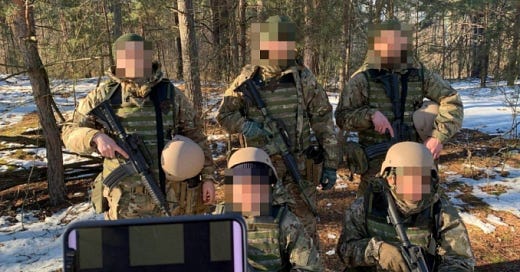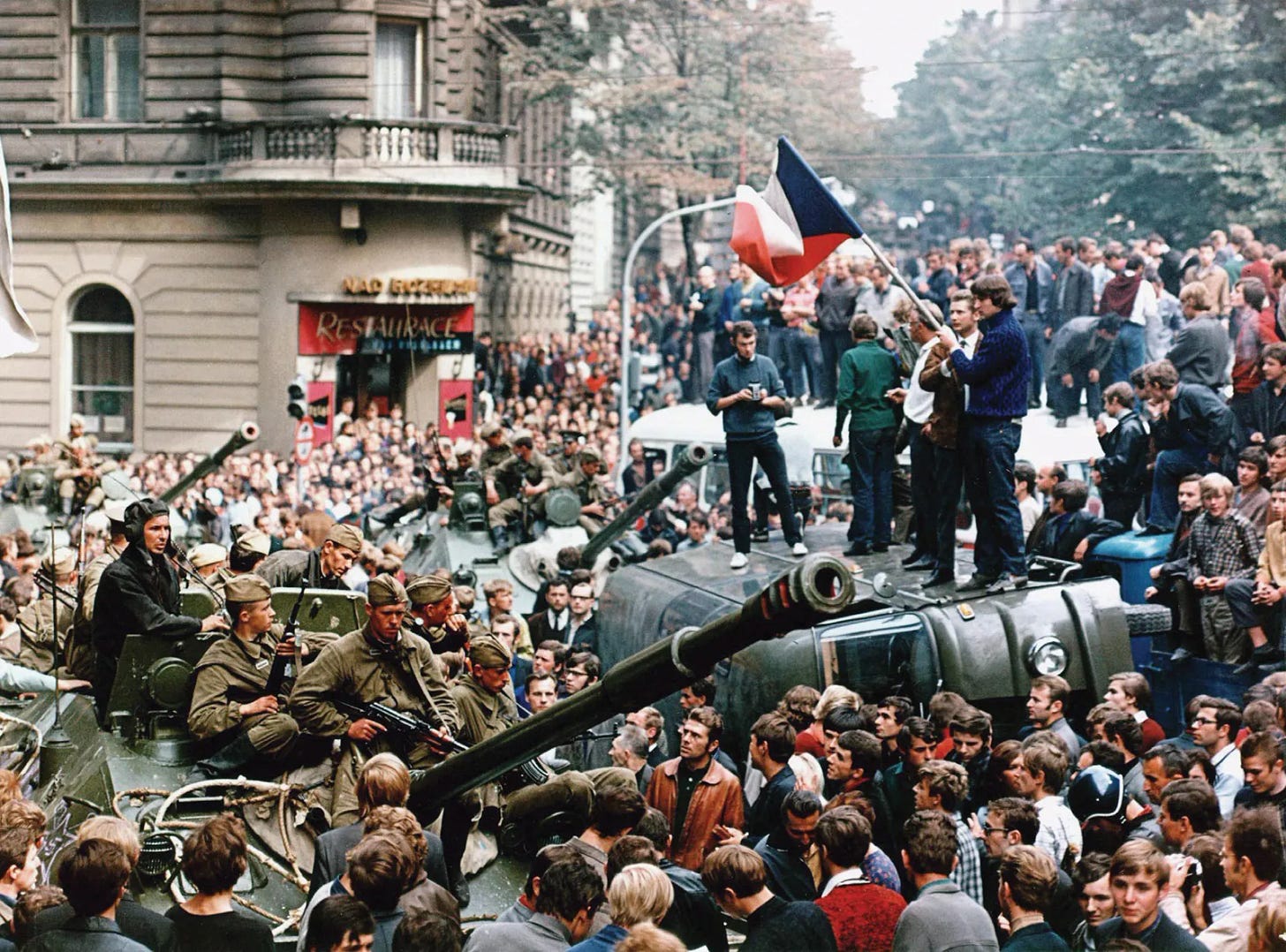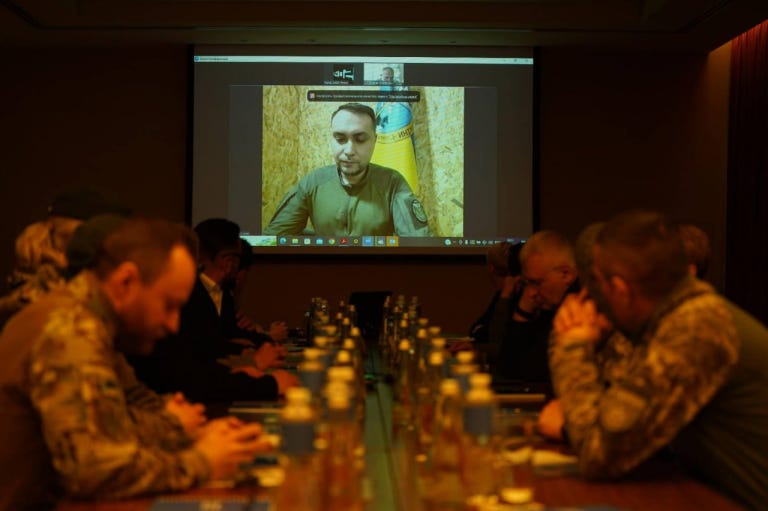The woman seated across from me appeared as unassuming as any suburban mother. Czech by origin, she navigates the realm of translations from Russian, delving into territories untouched by many. Her subject matter? The Russian armed resistance. A notion some might dismiss outright, but Anna's convictions run deep, challenging any preconceived notions. In her native Czech tongue, Anna Valentova pens narratives that might resonate globally, carving out a niche that stands alone in the world. Our discourse unfolded in the early days of May 2024.
"How did you come to know these outliers within the Russian populace, the ones truly standing against the tide? And what's the significance behind naming your Czech platform 'The Magnificent Eight'?"
The year was 1968 when Russian tanks rolled into my homeland, leaving a trail of devastation in their wake, callously claiming innocent lives. It was then, amidst the chaos of Prague's streets, that Moscow's Red Square bore witness to a remarkable spectacle: eight individuals, possessed of unparalleled courage, dared to defy the atrocities perpetrated by the Russian military machine. My admiration for these eight heroes first stirred with the passing of one among them, his obituary gracing the pages of a Czech newspaper. They became my lodestars. Thus, 'The Magnificent Eight' was born—a digital sanctuary proclaiming to the world that Russia is not a monolithic mass, blindly led astray by the currents of propaganda. It's a testament to the few, the brave, who stand in defiance. That, my friend, is the essence of my platform.
Yet, it wasn't until the tumultuous year of 2019 that I truly embarked on this journey. As Russians took to the streets en masse, decrying the sham of rigged elections, the iron fist of repression descended upon dissenters with brutal force. It was then that I turned my gaze to Russian media, particularly the likes of Channel Dozhd and other independent outlets, now silenced in their homeland, exiled voices. Through social media, I forged connections with these protestors, some of whom remain dear friends to this day.
Following the eruption of conflict in Ukraine, much like many, I found myself seeking avenues to aid. Amidst this hunger for information, March 2022 delivered a jolt as I watched a Ukrainian press conference unveiling captured Russians, defiantly proclaiming their intent to stand alongside Ukrainians and ultimately topple Putin. To me, it was a moment of incredulity. Here stood eight more courageous souls.
Yet, the silence around was deafening. No one chronicled their tales, so I took up the quill. I translated, I penned, I published. This quest led me down rabbit holes, uncovering Russian units in support of Ukraine, as well as clandestine resistance movements simmering within Russia's borders. And still, their stories languish in obscurity. So, I persist, giving voice to the forgotten.
2. Describe to us what kind of people do you meet? Who are they?
They are people across the spectrum, in terms of age, religion, political beliefs, professions...
At least six Russian troops are fighting on the side of Ukraine, but probably more. These are the Freedom of Russia Legion, which was formed from Russian prisoners of war in March 2022, and the Russian Volunteer Corps, which has been fighting alongside the Ukrainian militia since 2014. We must not forget the Siberian Battalion, linked to the Civic Council – a military-political organization of Russians based in Warsaw, then there are the battalions of Sheikh Mansoor and Dzhokhar Dudayev from Chechnya. And, for example, the United Caucasus unit – and others.
On the one hand, there are diversionary partisan groups working in Russia (for example, „railway partisans“ so successful that even British intelligence took them into account in their reports), and in addition to them, armed units of resistance. Some exist as armed wings of separatist movements of individual republics and regions, some as Russian branches of units fighting for Ukraine – and some simply as completely independent resistance initiatives against the Putin regime.
In addition, there are also active groups in Russia that do not agree with the violent protests, or at least do not consider them acceptable, but nevertheless resist the regime, including many supporters of Navalny, as we saw during his funeral, when thousands of people took to the streets despite the threat of punishment...
--------------
For example, there is a woman fighting in the Legion whose husband was shot dead in Ukraine by a Russian army officer because he refused to send his men to kill Ukrainians. Another girl was trained as a paramedic in the Legion. She left Russia to work for a Parisian fashion house quite long before the war and had a dream career there. She left it after the outbreak of the war because she considered it her duty to take the side of the resistance.
The commander of the Siberian Battalion is of Yakut/Sakha nationality, he used to be an officer in the Russian army, but he had a monstrous experience with how the peoples of Siberia are treated in Russia. The Russian authorities are disgustingly racist. He went to work in Poland, and since the outbreak of the war he has been trying to get into the Ukrainian International Legion.
3. How did they come up with the idea of resisting with weapons? What drives them?
Most of them are terribly ashamed of what their country is doing in their name. In the case of soldiers (the Freedom of Russia Legion), it is an effort to regain their military or even officer honor, which, in their opinion, the Russian army has lost by murdering innocents - and they consider it their duty to stand up for them. On the Ukrainian side, there are also many former peaceful civil society activists who "feel that peaceful protests in the face of terror in Ukraine have lost their meaning and are going nowhere."
This attitude is also widespread among partisans who move in Russia itself. These are not my interpretations; I am just quoting.
4. It is often said here that even Russian dissidents are actually imperial nationalists (See Navalny's speeches on Ukraine). How do these people feel about Russian imperialism?
Their ideologies span the gamut, from the imperialist fervor of the Russian Volunteer Corps to the fervent pursuit of freedom championed by the Siberian Battalion, who considers the imperial idea to be pure evil. It's exactly the same among the partisans. Collaborative efforts, such as incursions into the Belgorod region, underscore their shared goal: the dismantling of Putin's regime. As one voice proclaims, "only in a free Russia can one think about which path to take." I quote again.
During Prigozhin's coup attempt, despite his brutal crimes in Ukraine and elsewhere, some cheered for him in a certain way (the enemy of my enemy formula), even such as Mikhail Khodorkovsky, quite surprisingly, although he later diluted it a bit. Other groups, on the other hand, have distanced themselves very vigorously from the criminal Prigozhin, declaring their goals as pro-European and pro-democratic, many even anti-imperial. They are simply a product of their time.
Yet, amidst this mosaic of beliefs, one thread binds them all: a resolute belief in the reprehensible nature of Putin's regime, a conviction that fuels their defiance and unites them in their quest for change.
5.How old are they? How do they envision the future of Russia? Who is their role model? How can we help them?
Among the ranks of those fighting for Ukraine, there are youths barely out of their teens, alongside fathers and mothers torn from their families. And among the partisans, the mantle of resistance likely falls upon the shoulders of the younger generation. Yet, age proves no barrier to defiance, as exemplified by an amazing lady, Ms. Osipova, a septuagenarian stalwart in St. Petersburg's opposition movement.
Their visions for the future diverge each faction charting its own course. The Congress of People's Deputies, comprised of former Duma members, diligently crafts the blueprint for a new Russia, while the Civic Council meticulously plans the transition from impending upheaval to the dawn of free elections. Navalny's people, on the other hand, are promising to sweep out the oligarchs by force and introduce democratic processes, which would require regime change to take place through legal means – and that seems utopian under the current laws.
How can we aid them? By refusing to regurgitate propaganda and acknowledging their existence beyond the purview of Western media. Spread awareness of their plight, amplifying their voices in a world that often turns a deaf ear. And extend a hand to support endeavors like mine (my platform has an automated translation feature) , for I am but an ordinary Czech woman, striving to shed light on extraordinary tales of resilience and defiance.
6. How do Ukrainians rate them? Thanks to censorship, I guess no one in Russia knows them, or am I wrong?
Ukraine's Verkhovna Rada has taken a significant step, extending assistance to indigenous peoples occupied by Russia and recognizing the independence of select republics. Meanwhile, within the Ukrainian military, Head of Intelligence Budanov lauds the invaluable contribution of Russian volunteers, hailing them as autonomous entities operating in tandem with the Ukrainian Armed Forces, and offering unequivocal support.
Specific accounts from these volunteers paint a poignant picture of the warmth and acceptance they receive from ordinary Ukrainians upon learning of their Russian comrades-in-arms. While not universal, these encounters underscore a palpable sense of solidarity, with locals recognizing the sacrifice these Russians make in defense of their newfound cause.
In Russia, awareness of these movements exists, but it remains a matter of choice—those inclined seek out alternative sources, bypassing state propaganda via VPNs to access Western media and social networks.
The Freedom of Russia Legion has thousands of supporters in Russia. Some of them set fire to relay boxes near the tracks where military equipment is transported, or otherwise harm the regime. The Legion has around 300,000 followers on social media alone. In addition, a whole group from the Black Bridge partisan movement recently joined the Legion – these are the ones who blew up the FSB building in Rostov-on-Don. The Russian Volunteer Corps has armed supporters in Russia who themselves carry out guerrilla actions inside Russia.
The Siberian Battalion is part of the Citizens' Council - an exiled military-political organization that is joined, among others, by anti-Putin anonymous leaders of republics and regions that seek independence from Russia. They also have armed resistance units linked to them.
Despite relentless propaganda attempts to discredit them as mere criminal gangs, these resistance movements persist, quietly gathering strength and forging connections. As they inch closer to cohesive collaboration, the potential for a formidable resistance force looms large—a prospect whose magnitude is best left unquantified. You must understand that even for me there are safety barriers.
7. Is there a young generation in Russia that has not yet been brainwashed by the regime? And what about the pervasive Russian imperial narrative, do Russians perceive how toxic it is?
The narrative is clear: these movements exist, yet they contend with a landscape increasingly dominated by sophisticated propaganda and a populace divided between compliance and fervent militarism.
The Russians we are writing about are either leaving the imperial narrative for after Putin's fall, or dismissing it outright as toxic. We try to write primarily about those whose anti-imperial beliefs can withstand closer scrutiny – and recommend them for support. We try to inform as best we can about the others, because it is quite possible that the current turbulence will soon throw us into a situation in which this information will be very useful.
While my work may not yet be deemed important, I harbor a steadfast conviction that its significance will be recognized in due course. Time, as they say, will tell…
Thank you, Anna, for your work.
about
Alex Alvarova is Czech-Canadian author and communication expert, who lives in Boston, MA. A recognized authority in political marketing and public relations, a sought-after seminar leader, facilitator, podcaster and public speaker. In 2017 she wrote The Industry of Lies, a non-fiction work that introduces, outlines and fully supports a core concept: Russia used the 2013 presidential election in the Czech Republic as a trial run to perfect its hybrid-warfare aggression for altering the outcome of the 2016 US Presidential elections. In 2021, she published Feeding The Demons: The conquerors of America, a political thriller on behavioral propaganda. She wrote numerous expert articles on political marketing and algorithmic propaganda. Together with her co-host, expert on social media algorithms, Josef Holy, she hosts a czech podcast called Canaries In The Net, on algorithmic propaganda and AI.







